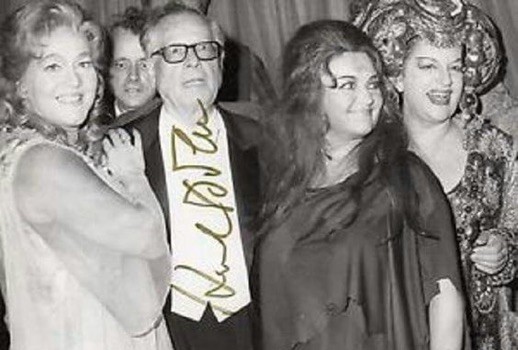
All five principal singers in this 1977 performance from the Bayerische Staatsoper were born during Strauss’ lifetime, with two (Hopf and Varnay) having launched their careers before his death in 1949.
Böhm, a protégé and great friend of the composer (Strauss dedicated Daphne to him), championed his works throughout his long life and was largely responsible for rescuing his lesser-known operas from obscurity, especially Die Frau ohne Schatten. Elektra was a Böhm specialty for over 40 years.
If you were not attending opera in the 1970s, the name of Ursula Schröder-Feinen is likely unknown to you. Hers was a brief, meteoric career, perhaps cut short by singing some heavy roles too often and too soon.
Her 1961 debut, as Aida, was in her native Gelsenkirchen at age 25 (or 23, depending on which source you trust). She was a member of the Deutsche Oper am Rhein from 1968 through 1972 and sang regularly throughout Germany’s second-tier houses. Her international career took off in 1970.
Her 1970 Met debut as Chrysothemis was under Böhm, who seems to have helped propel her career, concentrating on the Strauss heroines. While still in her 30s, her core repertoire consisted of Chrysothemis and Elektra, Salome, die Färberin (all of which she sang at the Met), as well as Senta, the Siegfried Brünnhilde, Ortrud, and Kundry. Other roles included Tosca, Turandot, Leonore in Fidelio, and Isolde.
But Schröder-Feinen never settled in one place for very long. She sang only 16 Met performances between 1970 and 1978 (with Böhm conducting 11 of them), 14 at Bayreuth over five years, and nine at Wiener Staatsoper. She also appeared with the companies in Milano, Berlin, München, Prague, Copenhagen, Amsterdam, Paris, Edinburgh, Montreal, Chicago, and San Francisco before her career was cut short in the late 1970s, shortly after turning 40, due to an unspecified vocal crisis (“…nach einer Stimmkrise” according to her Bayreuth bio).
As with many a former Wagnerian soprano, Astrid Varnay, among the greatest Brünnhildes of the 20th century, turned in her later years to the mezzo character Fach, specializing in Klytämnestra, Herodias, Kostelnicka, and Leokadja Begbick in Aufstieg und Fall der Stadt Mahagonny, her final role at the Met 38 years after her debut with the company. A bit of trivia which I always found of interest: Varnay was born in 1918 three weeks before fellow Swede Birgit Nilsson, with whom she shared many roles.
Leonie Rysanek maintained Chrysothemis in her active repertoire for 30 years before switching to Elektra (for the Götz Friedrich film) and Klytämnestra. Her interpretation is as legendary as her Kaiserin and Sieglinde. In this performance, at age 50, she is at her vocal and demented histrionic best.
If you came to Elektra through the introspective interpretations of Nina Stemme, Waltraud Meier, Adriana Pieczonka and Salonen, strap yourselves in: Böhm and company revel in all of the opera’s blood and guts glory.
Postscript: During the previous week I posted two broadcasts from Wiener Staatsoper’s mini Verdi Festival: Don Carlo with Ramón Vargas, Anja Harteros, and René Pape, and Simon Boccanegra with Dmitri Hvorostovsky, Barbara Frittoli, and Ferruccio Furlanetto (I skipped the Traviata with Domingo as Germont). Please visit my Mixcloud page at https://www.mixcloud.com/Jungfer_Marianne_Leizmetzerin/ to access them.


